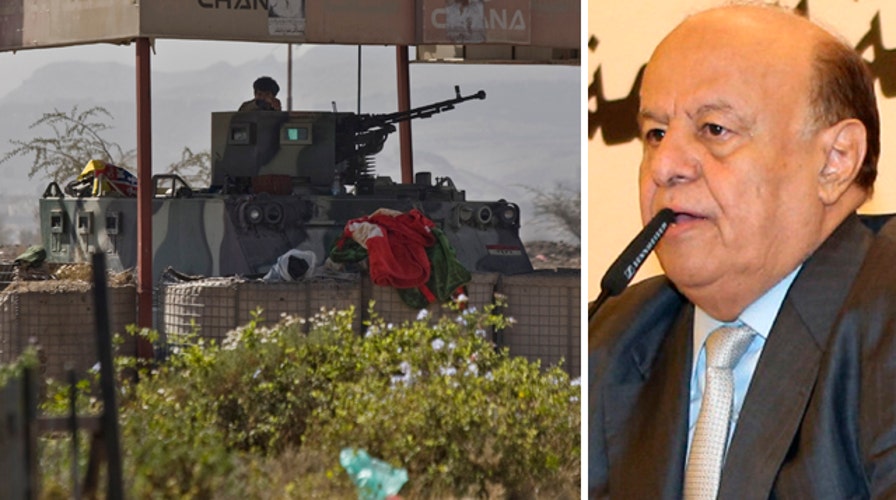Report: Yemen president, Cabinet resign under rebel pressure
John Huddy reports from Jerusalem
The State Department said late Thursday that it had reduced the number of American personnel working in Yemen due to the ongoing political instability in that country, which came to a head with the resignation of the country's U.S.-backed president and cabinet.
A Senior State Department official said that the U.S. Embassy in the capital, Sana'a, would remain open and operate as normal, though with reduced staff. The official did not specify how many staffers had been removed or how many remained. The official added that the U.S. is continuously reassessing the situation on the ground.
On Wednesday, Pentagon spokesman Col. Steve Warren told reporters that two American ships -- the USS Iwo Jima and the USS Ft. McHenry -- were on station in the Red Sea and prepared to receive any evacuees from Yemen's capital, Sana'a.
Shiite rebels known as Houthis, who are widely believed to be backed by Iran, now control the capital. Yemen's prime minister and his cabinet also stepped down Thursday.
President Abed Rabbo Mansour Hadi had earlier pledged political concessions in return for the rebels withdrawing from his house and the nearby presidential palace, but Houthi fighters remained deployed around both buildings throughout the day.
Military officials close to the president, who like the other officials spoke on condition of anonymity because they were not authorized to brief reporters, said Hadi resigned after the Houthis pressured him to give a televised speech to calm the streets.
State Department spokeswoman Jen Psaki said the U.S. was "troubled" by the reports of the fall of Hadi and his government.
"At this time, it is critical that all sides avoid violence," Psaki said in a statement. "The future of Yemen should be determined by the Yemeni people in accordance with Yemen's constitution ... All Yemenis have both a right and responsibility to peacefully participate in this process. The United States remains firmly committed to supporting all Yemenis in this endeavor."
U.S. intelligence officials have long feared the collapse of Yemen's government. The Al Qaeda affiliate based in Yemen, Al Qaeda in the Arabian Peninsula (AQAP), is the most lethal and active of the al Qaeda affiliates. More significantly, officials say there is growing cooperation between AQAP and Al Qaeda's affiliate in Syria, known as the Khorasan group. That cooperation includes operatives trained by AQAP moving to Syria with training in non-metallic explosives.
The unrest has also put a brake on any plans by President Barack Obama to transfer detainees held at Guantanamo Bay back to Yemen, the country of origin for most the remaining 122 terror suspects.
"The conditions in Yemen today aren't any different than what they have been," Defense Secretary Chuck Hagel told reporters Thursday, "and we don't send them back to Yemen."
Fox News' Catherine Herridge, Jennifer Griffin, and the Associated Press contributed to this report.





